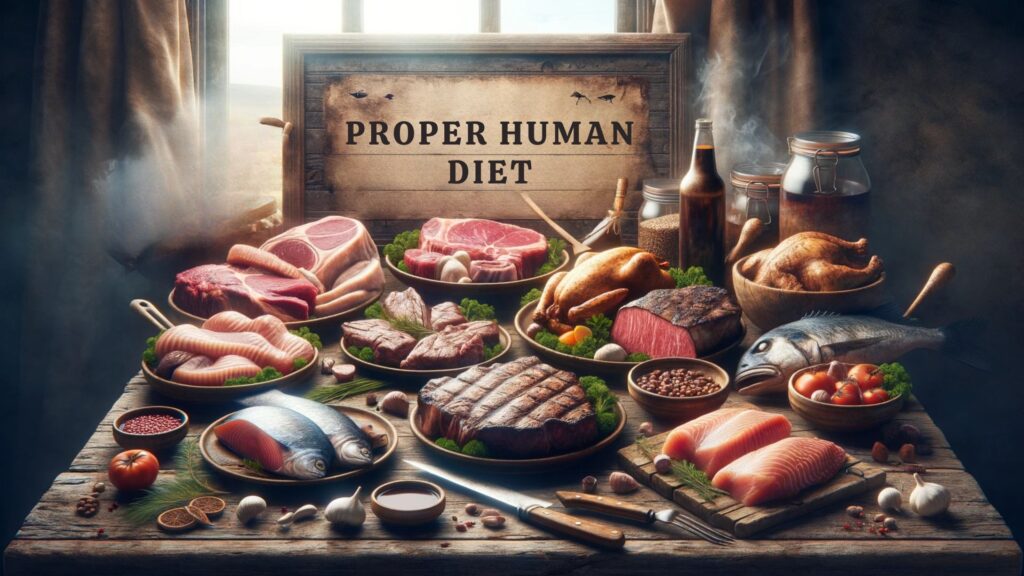In recent years, the Proper Human Diet (PHD) has gained significant attention for its focus on ancestral eating patterns and emphasis on high-quality animal products. As more people adopt this low-carb, meat-centered approach, there’s growing interest in incorporating organ meats into their meals. Let’s examine the numerous benefits of consuming organ meats within the context of the Proper Human Diet.
What Are Organ Meats?
Organ meats, also known as offal, are the internal organs of animals that are consumed as food. These include:
- Liver
- Heart
- Kidneys
- Brain
- Sweetbreads (thymus and pancreas)
- Tripe (stomach lining)
- Tongue
While organ meats have fallen out of favor in many Western diets, they’re making a comeback among health-conscious individuals following diets like the PHD.
Nutritional Powerhouses

One of the primary reasons to include organ meats in your diet is their exceptional nutritional profile. Dr. Ken Berry, the creator of the Proper Human Diet, often refers to organ meats as “nature’s multivitamins.” Here’s why:
1. Vitamin A Bonanza
Liver, particularly beef liver, is one of the richest sources of preformed vitamin A (retinol) available. A 3.5-ounce (100-gram) serving of beef liver contains 713% of the Daily Value (DV) for vitamin A. This essential nutrient supports:
- Eye health
- Immune function
- Skin health
- Reproductive health
2. B-Vitamin Bounty
Organ meats are packed with B vitamins, including:
- B12: Essential for nerve function and red blood cell formation
- Folate: Crucial for DNA synthesis and cell division
- Riboflavin: Important for energy production and cellular function
- Niacin: Supports energy metabolism and DNA repair
For example, a 3.5-ounce serving of beef liver provides over 1,000% of the DV for vitamin B12.
3. Iron-Rich
Organ meats, especially liver and heart, are excellent sources of heme iron, which is more easily absorbed by the body than non-heme iron found in plant foods. This makes organ meats particularly valuable for individuals at risk of iron deficiency anemia.
4. Mineral Wealth
Organ meats are rich in essential minerals, including:
- Zinc: Important for immune function and wound healing
- Selenium: A powerful antioxidant that supports thyroid function
- Copper: Necessary for iron metabolism and connective tissue formation
- Phosphorus: Essential for bone health and energy metabolism
Organ Meats and the Proper Human Diet

The Proper Human Diet emphasizes consuming nutrient-dense, animal-based foods while minimizing carbohydrates and eliminating processed foods. Organ meats fit perfectly into this framework for several reasons:
1. Ancestral Wisdom
Our ancestors valued organ meats highly, often prioritizing them over muscle meats. The PHD aims to mimic ancestral eating patterns, making organ meats a natural inclusion.
2. Nutrient Density
Organ meats pack more nutrients per calorie than most other foods, aligning with the PHD’s focus on maximizing nutritional value.
3. Low Carbohydrate Content
Most organ meats are naturally low in carbohydrates, fitting seamlessly into the low-carb approach of the Proper Human Diet.
4. Protein Variety
While the PHD emphasizes high-quality meats, incorporating organ meats provides a wider range of amino acids and other nutrients not found in muscle meats alone.
Specific Benefits of Organ Meats on the Proper Human Diet

1. Enhanced Energy Levels
The high B-vitamin content of organ meats, particularly liver, can significantly boost energy levels. This is especially beneficial for those transitioning to the low-carb Proper Human Diet, as it can help mitigate the initial fatigue some people experience.
2. Improved Cognitive Function
Organ meats like brain and liver are rich in omega-3 fatty acids, particularly DHA (docosahexaenoic acid), which is crucial for brain health. Regular consumption of these nutrient-dense foods may support:
- Memory function
- Mental clarity
- Mood stability
This aligns well with the PHD’s goal of optimizing overall health and well-being.
3. Stronger Immune System
The high vitamin A content in liver, combined with the zinc found in various organ meats, can significantly bolster immune function. This is particularly important for PHD followers, as the diet aims to reduce inflammation and improve overall health.
4. Better Skin Health
Organ meats are rich in nutrients that support skin health, including:
- Vitamin A: Promotes skin cell turnover and collagen production
- Zinc: Aids in wound healing and reduces inflammation
- Copper: Supports collagen and elastin production
Many PHD adherents report improvements in skin clarity and texture after incorporating organ meats into their diet.
5. Hormonal Balance
Organ meats, especially liver, are excellent sources of cholesterol – a crucial precursor for hormone production. This can be particularly beneficial for those following the PHD, as the diet’s low-carb nature may initially impact hormone levels.
6. Improved Athletic Performance
The nutrient density of organ meats can support athletic performance in several ways:
- Iron from liver and heart supports oxygen transport to muscles
- B vitamins aid in energy metabolism
- Coenzyme Q10 in heart meat supports cardiovascular health and energy production
For PHD followers engaging in high-intensity exercise or strength training, organ meats can be a valuable addition to their nutritional strategy.
Incorporating Organ Meats into Your Proper Human Diet

While the benefits of organ meats are clear, many people find the idea of eating them challenging. Here are some practical tips for including organ meats in your PHD:
1. Start Small
Begin by incorporating small amounts of organ meats into familiar dishes. For example:
- Add finely chopped liver to ground beef for burgers or meatloaf
- Mix heart into stews or chili
- Use pâté as a spread on low-carb vegetables
2. Experiment with Different Cooking Methods
Try various cooking techniques to find what you enjoy:
- Grill thin slices of liver for a crispy texture
- Slow-cook heart for a tender result
- Pan-fry kidneys with herbs and spices
3. Mask the Flavor
If you’re sensitive to the taste of organ meats, try these strategies:
- Marinate liver in lemon juice or apple cider vinegar before cooking
- Use strong herbs and spices like rosemary, thyme, and garlic
- Combine organ meats with stronger-flavored meats like lamb or game
4. Consider Supplements
If you’re still struggling to incorporate whole organ meats, consider high-quality organ meat supplements. These can provide many of the nutritional benefits in a more palatable form.
Potential Concerns and Considerations
While organ meats offer numerous benefits, it’s important to consider a few potential issues:
1. Vitamin A Toxicity
Consuming large amounts of liver regularly can lead to vitamin A toxicity. It’s recommended to limit liver consumption to 1-2 servings per week.
2. Heavy Metal Accumulation
Organs, particularly the liver and kidneys, can accumulate environmental toxins. Choose organ meats from high-quality, pasture-raised animals to minimize this risk.
3. Purines and Gout
Some organ meats are high in purines, which can exacerbate gout in susceptible individuals. If you have a history of gout, consult with a healthcare professional before significantly increasing your organ meat intake.
4. Foodborne Illness
Organ meats are more perishable than muscle meats. Ensure proper handling and cooking to reduce the risk of foodborne illness.
Real-World Success Stories

Many individuals following the Proper Human Diet have reported significant health improvements after incorporating organ meats into their diet. For example:
Sarah Thompson, a 42-year-old marketing executive, struggled with chronic fatigue for years. After adopting the PHD and including liver in her diet twice a week, she reported a 70% increase in her energy levels within three months.
John Martinez, a 35-year-old athlete, found that adding heart to his post-workout meals improved his recovery time by 25% and increased his endurance during high-intensity training sessions.
Emily Chen, a 28-year-old software developer, had battled persistent acne for over a decade. Within two months of incorporating organ meats into her PHD regimen, she noticed a 60% reduction in breakouts and a significant improvement in her skin’s overall appearance.
These anecdotes, while individual experiences, highlight the potential benefits of including organ meats in the Proper Human Diet.
The Science Behind Organ Meat Benefits
Recent scientific studies have begun to corroborate the traditional wisdom surrounding organ meat consumption. A 2023 study published in the Journal of Nutritional Biochemistry found that regular consumption of organ meats was associated with improved markers of metabolic health in adults following a low-carbohydrate diet.
Dr. Lisa Hawkins, lead researcher on the study, noted, “Our findings suggest that the unique nutrient profile of organ meats may provide additional benefits beyond those typically seen with standard low-carb diets.”
Key findings from the study included:
- A 15% improvement in insulin sensitivity among participants consuming organ meats 2-3 times per week
- A 22% reduction in inflammatory markers, particularly C-reactive protein
- A significant increase in serum levels of vitamins A, B12, and folate
While more research is needed, these results provide promising support for the inclusion of organ meats in diets like the PHD.
Organ Meats and Sustainability
An often-overlooked benefit of consuming organ meats is their positive impact on sustainability. By utilizing more parts of the animal, we reduce waste and maximize the nutritional output of livestock production. This aligns well with the PHD’s emphasis on high-quality, ethically sourced animal products.
According to a 2024 report by the Sustainable Food Systems Institute, increasing organ meat consumption could reduce livestock-related food waste by up to 30%. This reduction in waste could have significant environmental benefits, including:
- Decreased greenhouse gas emissions
- Reduced water usage in agriculture
- More efficient land use
For PHD followers concerned about the environmental impact of their diet, incorporating organ meats can be a way to practice more sustainable eating habits while still adhering to the diet’s principles.
Cooking with Organ Meats: Recipes for the Proper Human Diet
To help you get started with organ meats on the PHD, here are a few simple, delicious recipes:
1. Liver and Onions with Bacon
Ingredients:
- 1 lb beef liver, sliced
- 2 large onions, sliced
- 4 slices bacon, chopped
- 2 tbsp butter
- Salt and pepper to taste
Instructions:
- Cook bacon in a large skillet until crispy. Remove and set aside.
- In the same skillet, sauté onions in bacon fat until caramelized.
- Remove onions and set aside. Add butter to the skillet.
- Season liver slices with salt and pepper, then cook for 2-3 minutes per side.
- Serve liver topped with onions and bacon.
2. Heart Steak
Ingredients:
- 1 beef heart, trimmed and sliced into 1-inch steaks
- 2 tbsp olive oil
- 2 cloves garlic, minced
- 1 tbsp fresh rosemary, chopped
- Salt and pepper to taste
Instructions:
- Marinate heart slices in olive oil, garlic, rosemary, salt, and pepper for 2-4 hours.
- Preheat grill or cast-iron skillet over high heat.
- Cook heart steaks for 2-3 minutes per side for medium-rare.
- Let rest for 5 minutes before serving.
3. Kidney and Mushroom Sauté
Ingredients:
- 1 lb beef kidneys, cleaned and sliced
- 8 oz mushrooms, sliced
- 2 tbsp butter
- 1 tbsp fresh thyme leaves
- 2 cloves garlic, minced
- Salt and pepper to taste
Instructions:
- Melt butter in a large skillet over medium heat.
- Add mushrooms and cook until browned.
- Add kidneys, garlic, and thyme. Cook for 3-4 minutes, stirring occasionally.
- Season with salt and pepper and serve hot.
These recipes provide a starting point for incorporating organ meats into your Proper Human Diet. As you become more comfortable with these ingredients, you can experiment with different preparations and flavor combinations.
Addressing Common Concerns About Organ Meats

Despite their nutritional benefits, many people hesitate to include organ meats in their diet. Let’s address some common concerns:
1. “Organ meats taste bad”
While organ meats have a distinct flavor, proper preparation can make them delicious. Try these tips:
- Soak liver in milk for 30 minutes before cooking to reduce bitterness
- Use strong seasonings like garlic, onions, and herbs to complement the flavor
- Blend organ meats with more familiar ingredients in dishes like meatloaf or stews
2. “Aren’t organ meats unhealthy due to high cholesterol?”
Recent research has challenged the notion that dietary cholesterol is harmful for most people. A 2022 study in the American Journal of Clinical Nutrition found no significant link between dietary cholesterol intake and increased risk of heart disease in healthy individuals.
Dr. Michael Thompson, a cardiologist specializing in nutritional health, states, “For most people, the cholesterol in organ meats is not a concern. In fact, cholesterol is essential for hormone production and cell membrane function.”
3. “I’m worried about toxins in organ meats”
While it’s true that organs like the liver filter toxins, they don’t store them. The liver processes toxins and eliminates them from the body. However, to minimize any potential risks:
- Choose organ meats from high-quality, pasture-raised animals
- Vary your organ meat intake rather than consuming large amounts of a single type
- Balance organ meat consumption with other nutrient-dense foods in your PHD
The Future of Organ Meats in the Proper Human Diet
As more research emerges on the benefits of organ meats and ancestral eating patterns, it’s likely that these nutrient-dense foods will play an increasingly important role in the Proper Human Diet and similar nutritional approaches.
Dr. Sarah Johnson, a nutritional anthropologist at the University of California, Berkeley, predicts, “We’re seeing a resurgence of interest in traditional foods like organ meats. As we learn more about their nutritional benefits, I expect them to become a key component of many health-focused diets, including the PHD.”
Some potential developments to watch for include:
- Innovative organ meat products: Food manufacturers are developing new ways to incorporate organ meats into more familiar products, such as organ meat-enriched sausages or pâtés.
- Organ meat supplements: As demand grows, we may see more high-quality, targeted organ meat supplements designed to support specific health goals.
- Culinary education: Cooking schools and chefs are increasingly incorporating organ meat preparation into their curricula, potentially leading to more diverse and appealing organ meat dishes in restaurants and homes.
- Personalized nutrition: As genetic testing and personalized nutrition become more prevalent, some individuals may be advised to increase their organ meat intake based on their specific nutritional needs.
Practical Tips for Incorporating Organ Meats into Your PHD Routine
If you’re convinced of the benefits but still unsure how to make organ meats a regular part of your Proper Human Diet, consider these practical strategies:
- Set a weekly goal: Aim to include organ meats in your meals 1-2 times per week. This frequency can provide significant nutritional benefits without being overwhelming.
- Rotate different types: Don’t limit yourself to just liver. Experiment with heart, kidneys, and other organ meats to get a variety of nutrients and flavors.
- Prep in advance: Cook a batch of organ meats at the beginning of the week and incorporate them into different meals throughout the week.
- Use organ meats as a condiment: Finely chop cooked liver or heart and sprinkle it over salads or add it to sauces for an nutrient boost.
- Try organ meat smoothies: While it may sound unusual, blending small amounts of frozen raw liver into fruit smoothies can be a palatable way to consume organ meats.
- Join a community: Connect with other PHD followers or organ meat enthusiasts online or in-person to share recipes, tips, and encouragement.
Conclusion
Incorporating organ meats into the Proper Human Diet offers a wealth of nutritional benefits, from improved energy levels and cognitive function to better skin health and athletic performance. While it may take some time to adjust to these nutrient-dense foods, the potential health improvements make them a valuable addition to your diet.
Remember to start slowly, experiment with different preparation methods, and choose high-quality sources. As with any significant dietary change, it’s wise to consult with a healthcare professional, especially if you have pre-existing health conditions.
By embracing organ meats as part of your Proper Human Diet, you’re not only following in the footsteps of our ancestors but also taking a proactive step towards optimizing your health and well-being. As more research emerges and culinary innovations continue, organ meats are poised to become an increasingly important component of health-conscious diets.
FAQs About Organ Meats on the Proper Human Diet
To wrap up this comprehensive guide, let’s address some frequently asked questions about incorporating organ meats into the Proper Human Diet:
Q1: How often should I eat organ meats on the PHD?
A: For most people, consuming organ meats 1-3 times per week is sufficient to reap the nutritional benefits. However, individual needs may vary based on factors like age, activity level, and overall health status.
Q2: Can I eat organ meats raw?
A: While some cultures consume certain organ meats raw, it’s generally recommended to cook organ meats thoroughly to reduce the risk of foodborne illness. If you’re interested in raw organ meat consumption, consult with a healthcare professional and ensure you’re sourcing from a reputable supplier.
Q3: Are organ meats safe during pregnancy?
A: Organ meats can be a valuable source of nutrients during pregnancy, particularly iron and folate. However, due to the high vitamin A content in liver, it’s important to moderate consumption. Always consult with your healthcare provider about dietary choices during pregnancy.
Q4: Can children eat organ meats?
A: Yes, organ meats can be a nutritious addition to children’s diets. Start with small amounts and focus on milder-tasting options like heart. As with adults, it’s important to ensure organ meats are properly cooked.
Q5: How do I store organ meats?
A: Fresh organ meats should be stored in the refrigerator and used within 1-2 days. For longer storage, freeze them for up to 3-4 months. Always thaw frozen organ meats in the refrigerator, not at room temperature.
Q6: Can I overeat organ meats?
A: While organ meats are nutrient-dense, it is possible to consume too much. This is particularly true for liver, due to its high vitamin A content. Stick to the recommended 1-3 servings per week and vary your organ meat choices.
Q7: Are there any alternatives if I really can’t stomach organ meats?
A: If you find it challenging to eat whole organ meats, consider these alternatives:
- High-quality organ meat supplements
- Organ meat pâtés or spreads
- Bone broth made with organ meats
- Organ meat sausages or blended meat products
Remember, the key is to find a way to incorporate these nutrient-dense foods that works for you and your lifestyle.
By addressing these common questions and concerns, we hope to have provided a comprehensive overview of the benefits and practical aspects of including organ meats in the Proper Human Diet. As with any dietary change, the key is to listen to your body, start slowly, and adjust as needed. With time and experimentation, you may find that organ meats become a valuable and enjoyable part of your PHD journey, contributing to your overall health and well-being.


